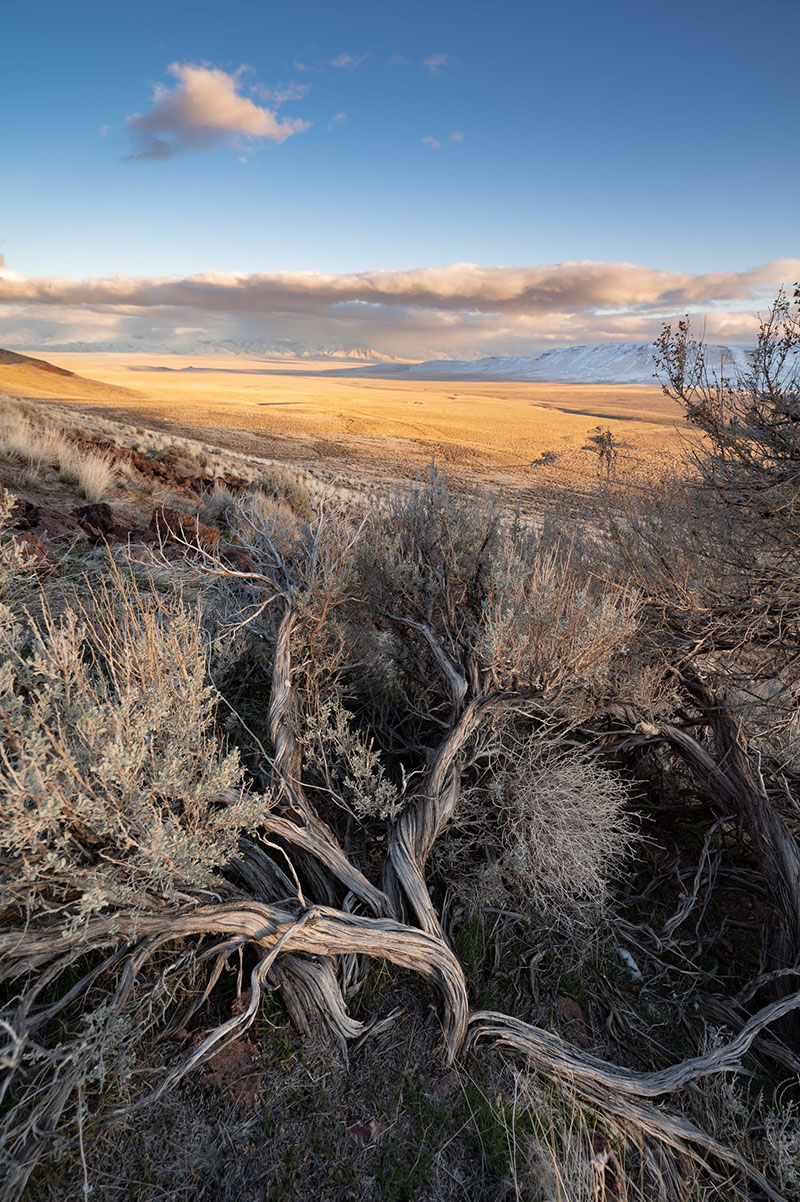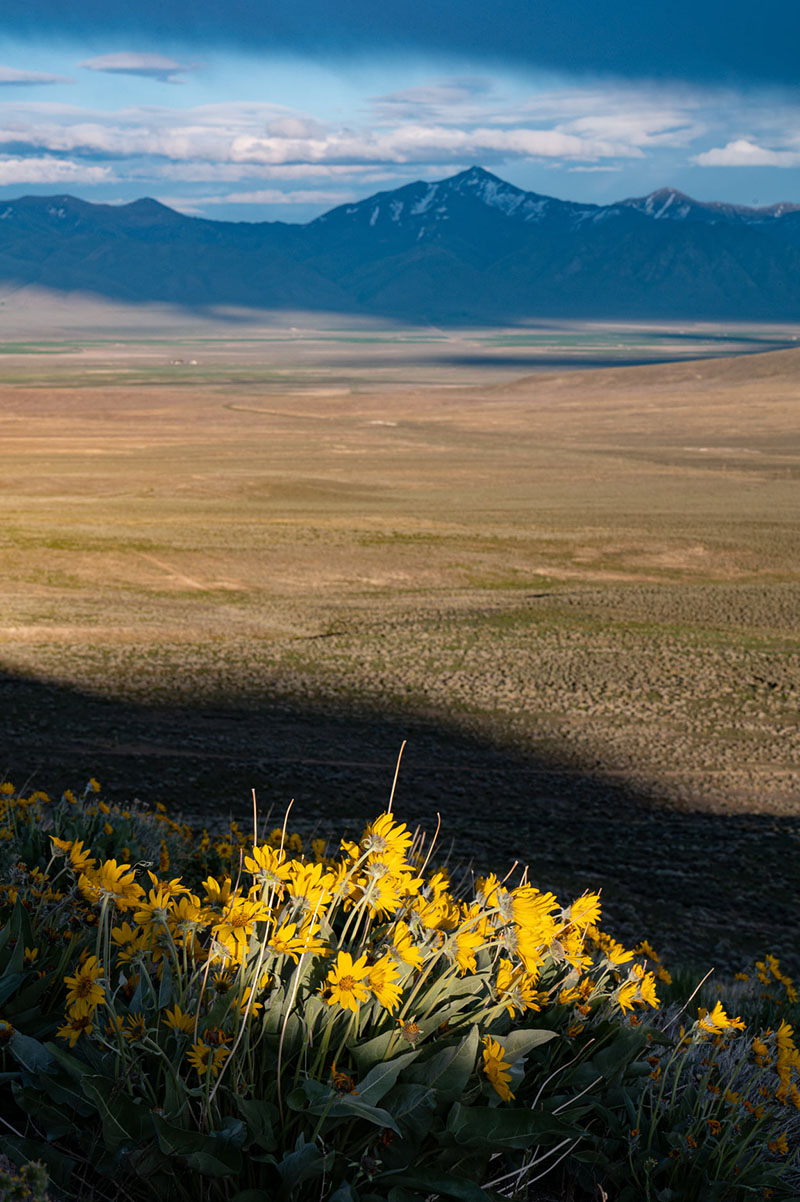When Land I Love Holds Lithium:
Max Wilbert on Thacker Pass, Nevada
by Katie Singer
After I reviewed IEEE’s recent book about electric vehicles (EVs), I heard about an underground transformer that exploded 50 feet from an LA friend’s house on a Saturday morning, typically a time of low-electricity-demand. I wondered: could charging several EVs cause a transformer to overheat and explode?
A reader of my review commented that investing in e-vehicles is like rearranging deck chairs on the Titanic.
Then, I talked with Max Wilbert. Max grew up believing that solar and wind energy and electric vehicles would help sustain our society. In his twenties, he learned how “renewables” and EVs actually depend on fossil fuels throughout their lifecycles. He teamed up with Derrick Jensen and Lierre Keith to write Bright Green Lies: How the Environmental Movement Lost Its Way and What We Can Do About It (2021). In 2020, after learning about a proposed lithium mine in Nevada, he started Protect Thacker Pass. This account came from conversations Max and I had in April and May, 2023.
Max Wilbert
I started learning about lithium while researching battery energy storage for Bright Green Lies. Lithium is a light metal. In batteries, it can hold a high density of power, charge fast and last long. Lithium-ion batteries power mobile devices like smartphones, laptops, tablets, smartwatches and electric vehicles. The battery for a 3000-pound Tesla Model S’ requires 138 pounds (62.6 kg) of lithium. The irony is not lost on me: corporations and environmentalists promote EVs because they don’t emit greenhouse gases while driving. But manufacturing and discarding EVs—and expanding the power grid to charge them—ravage ecosystems.
I witnessed wind turbines chop up birds in Spring Valley, Nevada. In eastern Oregon, I saw swathes of native forests cut down for utility-scale solar. I’ve read about lithium extraction’s prodigious water use in Argentina, Bolivia, Chile, Tibet—and at the U.S.’s first lithium mine, in Silver Peak, Nevada.
In 2017, research led me to Lithium Americas Corporation’s (LAC’s) plan to turn part of the Great Basin—a biodiverse and exquisite ecosystem between Boise and Reno known as Thacker Pass—into an industrial extraction zone stretching over more than 17,000 acres. Thacker Pass holds the U.S.’s largest known lithium deposits. The corporation’s open pit alone would cover two square miles in the mine’s first stage, and it could triple in size. Tailings piles, processing facilities and treatments ponds would sprawl across yet more land. The mine would burn 11,000 gallons of diesel fuel per day and rely on more than 75 semi-truck loads of sulfur (oil refinery waste) to process the ore. It would consume and pollute more than 1.5 billion gallons of water per year, dropping water tables and potentially drying out fourteen springs.
In the summer of 2020, when I learned that the Trump Administration was fast-tracking a permit to mine lithium at Thacker Pass, I had to visit.
Visiting Thacker Pass
Two friends and I drove to Thacker Pass in October, 2020. Almost entirely public land, you can pull off any dirt road and park without trespassing. The first afternoon, the heat and dust overwhelmed me. But then we climbed up a cliff overlooking the Great Basin. Rabbit-brush yellow flowers were in full bloom. At sunset, the pollinators came out in huge numbers and variety. Insects are such a barometer of ecological health. They struggle with chemicals and artificial light. At Thacker Pass, they had a haven.
For sixteen million years, stones, wind and water have shaped this place. Pronghorn hooves and pygmy rabbits have left footprints. Burrowing owls have protected their nests. Golden eagles have circled above the silent expanse. Lahontan cutthroat trout have flicked in the creeks.
The first morning, stepping out of my sleeping bag, I saw a red-tailed hawk feather at my feet, to the west. I turned slowly. A prairie falcon feather lay in the east, and two raven feathers in the south. To the north, Phasianidae—a sage-grouse feather.
My mind rebelled.
And then the feathers seemed to speak: We need your help to protect this place.
Establishing camp
I called Will Falk, an attorney and longtime friend. I told him I was thinking of starting a protest camp. Will said, “I can commit for two weeks.”
A half dozen friends joined us. We drafted a website and a fundraising page, studied the law, wrote a press release and reviewed best and worst-case scenarios. On January 15th, 2021, the day that the Bureau of Land Management (BLM) issued Lithium Americas Corporation the permit to mine Thacker Pass, we set up camp.
We knew that our effort was a longshot. We knew that the federal government, the county, the country’s largest auto company, Republicans and Democrats…all supported mining Thacker Pass. We also know that defeat is guaranteed only when you don’t try.
Within days of our arrival, BLM police showed up and asked about our intentions. We told them that we aimed to stop the mine. They spelled out the BLM’s 14-day camping limit. We said, “We’re not camping. We’re engaging in a protest vigil with a protected First Amendment right to assemble and voice political opinions.”
The BLM threatened to fine or arrest us.
We decided to follow the 14-day camping limit and take a break every two weeks from sleeping there. The BLM kept track of our cars. When Will or I went home or into a nearby town to shower, supporters stayed in the camp.
We had a tipi-shaped tent with a stove inside and a cord of wood. But within the first week, blizzards brought 40+ mile-per-hour winds—too strong for the tipi. So, we stayed in our cars. During the first few months, our numbers fluctuated from a few people to ten. Sometimes, for a few days, I was the only one there.
Learning about Thacker Pass from native elders
When we started the camp, we didn’t know anyone from nearby Tribes. By March, 2021, we had made friends in the Northern Paiute and Western Shoshone communities. Three reservations were within 50 miles of Thacker Pass, but none of them knew about the mining project. As soon as we told them, many wanted to fight it; and the camp began to grow.
Native elders began to visit and tell us about the land and its history. They told about an intertribal conflict and massacre about 200 years ago. It gave Thacker Pass, which looks like a crescent moon, its Paiute name, Peehee Mu’huh, which means “rotten moon.” They told stories of U.S. Army soldiers hunting Paiutes in Thacker Pass. This led to another massacre, on September 12, 1865, of dozens of Paiute women, elders and children.
Several of the elders arrived at the camp in wheelchairs. They wanted to do ceremony and tell stories, but they needed a bathroom. The nearest gas station was twenty miles away. Will and I dug a pit and built a toilet seat and a privacy screen—a simple latrine. The BLM did not like it. But then, the elders could visit.
Gaining size, attention and complexity
The New York Times, France’s Le Monde, NPR and CNN ran stories about us. Some weekends, we had as many as 200 people on-site. This was good—but numbers created difficulties. Despite camp rules, some people drank and did drugs. On multiple occasions, ostensible allies threatened Will and me with violence.
In late August, 2021, the BLM fined Will and me $49,890.13 for building the latrine. They threatened further fines and legal action if we did not close the camp.
With a second winter approaching, numbers dwindling and threats of violence and retribution ringing in our ears, we packed up on October 15, 2021, exactly ten months after we had launched our camp.
To protect Thacker Pass, we turned to legal strategies.
The lawsuits
The BLM issued Lithium Americas Corporation a permit to construct the mine in January 2021. In February, weeks after our protest camp began, a local rancher filed the first lawsuit against LAC. He alleged that the mine would violate the Endangered Species Act by harming Lahontan Cutthroat Trout; and it would cause irreparable harm to springs, wet meadows and water tables. Four environmental groups, including Basin and Range Watch and Wildlands Defense, soon filed a lawsuit claiming that the mine would cause irreversible ecological damage, and that the project’s impacts had not been adequately studied.
In July, Will Falk filed a lawsuit on behalf of the Reno-Sparks Indian Colony, the People of Red Mountain, and the Burns Paiute Tribe.
Judge Miranda Du heard the cases. A former corporate lawyer, an Obama appointee, she disclosed early on that she owns an electric car and holds stock in an EV company.
The environmental groups and the Tribes asked for a preliminary injunction to stop any construction until the lawsuit ended.
In Autumn, 2021, Judge Du ruled that the BLM had complied with federal laws and denied the preliminary injunction. This was the first of a long series of legal defeats rooted in corporate power, weak environmental laws and total disrespect for Native People.
By November, 2021, the Reno Sparks Indian Colony had gathered written evidence of the 1865 massacre at Thacker Pass, of the site’s cultural importance, and the BLM’s law-breaking. The Tribes asked the judge to consider this new information in the trial. In January 2022, Judge Du denied this request, saying that she was too close to deciding on the case to allow changes. (A full year passed before she actually made her decision.)
The Winnemucca Indian Colony also claimed that they had not been consulted about the project, and they filed for inclusion in the lawsuit. The BLM said that they had been consulted. Judge Du denied this Tribe’s request.
By late 2021, we knew that chances of stopping the mine in the courts were slim. Even if we won the lawsuit, the mining company could modify their permit request and reapply. The BLM would then have to grant them permission to mine, because an 1872 law says that mining is “the highest and best use” of public lands.
Rulings, expectations and appeals
Will Falk and I appealed the BLM’s fining us $49,890.13 to the Bureau’s own Interior Board of Land Appeals. If we lose, we’ll have to pay the fine—and take the fight to federal court.
In January, 2023, General Motors announced that it will invest $650 million in the Thacker Pass mine. GM expects the mine will provide enough lithium for one million electric vehicles, annually. Most of these will likely be large, luxury cars and trucks, since profit margins for modest cars are slim.
In February, 2023, Judge Du issued her final ruling in the lawsuits. Excepting one minor issue, she decided that the mine permit was legal and correct.
Within days, Nevada Lithium Corporation began constructing the mine.
In response, the Reno-Sparks Indian Colony, the Burns Paiute Tribe, and the Summit Lake Paiute Tribe filed a new lawsuit; and the environmental organizations appealed their case to the 9th Circuit Court. These cases are ongoing.
The fight goes on
Between February and April, 2023, to prepare for the mine’s construction, Lithium Nevada bulldozed several thousand acres of old growth sagebrush. They expect hundreds of workers on-site in June.
On April 25, 2023, an elder from the Pyramid Lake Paiute tribe and a spiritual leader from the Fort McDermitt Paiute Shoshone Tribe led a peaceful, non-violent prayer action that shut down the mine’s construction for one day. Aware that the mine will require five million gallons of water daily, the elders prayed with the water and to the water. They prayed for ancestors who were killed in the 1865 massacre. Our group blocked the road, and I climbed on top of an excavator. No police showed up.
On May 11, again directed by spiritual leaders, water protectors set up a tipi to block construction of Lithium Nevada Corporation’s water pipeline. The elders named the prayer camp Ox Sam, after an ancestor who survived the 1865 massacre, and Newe Momokonee Nokotun, which means “Indigenous women’s camp.”
On May 13, Lithium Nevada sent notice that it planned to file a Protection Order to keep me and three others from the camp.
To keep the focus on protecting Thacker Pass, we each decided to leave the area. Off-site now, I continue to participate—and to live with heart-squeezing grief.
While bulldozers roll, the movement to Protect Thacker Pass continues.
Clearly, the public, policymakers and investors need educational forums that recognize the situation’s complexities and explain how manufacturing electric vehicles and renewables and upgrading our electric grid threaten ecosystems. We need to stop destroying biodiverse and culturally significant lands. We need policy changes that recognize nature’s limits. We need to learn how to live within our ecological means.
We need brave people to stand up and stop the destruction. The elders have called for supporters from far and wide to join them in an ongoing ceremony of protection for Thacker Pass’s waters and land. Here are websites and videos to learn more:
https://www.oxsam.org
https://www.protectthackerpass.org
May 12 Prayer Action at Peehee Mu-huh Thacker Pass Lithium Mine
Will Falk on lithium
https://www.maxwilbert.substack.com
KATIE SINGER writes about technology’s impacts on nature. She believes that if she’s not aware of the problem, then she can’t be part of the solution. She dreams that every user learns about the supply chain of one substance in their computer. Her books include An Electronic Silent Spring, Honoring Our Cycles and The Wholeness of a Broken Heart. Visit https://katiesinger.substack.com, https://OurWeb.tech and https://ElectronicSilentSpring.com.
Sign-up for a free or paid Subscription to Katie Singer’s Substack



